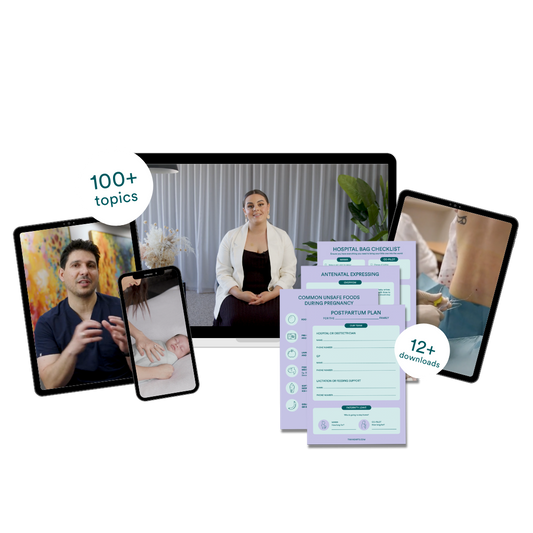When your toddler starts showing symptoms like vomiting and diarrhoea, you’re likely facing gastroenteritis. This common virus infection is highly contagious and can spread quickly to other family members.
Knowing how to recognise the early signs of gastro in toddlers can make a significant difference in managing the illness and minimising its impact on your family's daily life.
In this article, we'll discuss how to identify gastro symptoms early, provide adequate home care and keep your entire family healthy.
What is Gastro?
Gastroenteritis, commonly known as "gastro," is an infection that causes inflammation of the stomach and intestines. It’s often caused by highly contagious viral infections like rotavirus and norovirus. These viruses spread through close contact with infected individuals or contaminated surfaces.
When you come into contact with these viruses, they enter the body through the mouth and invade the lining of the intestines. This invasion triggers an immune response, leading to inflammation and irritation of the gastrointestinal tract, resulting in symptoms like watery diarrhoea and vomiting.
Gastro symptoms usually develop quickly after exposure to the virus, often within one to three days. The severity of symptoms can vary depending on the person, but gastroenteritis in newborn babies and toddlers is usually more severe than it is in older kids and adults because the risk of dehydration from diarrhoea and vomiting is much higher.
Gastro in Toddlers: Signs and Symptoms
Here are the most common signs of gastro in toddlers:
- Not wanting to eat or drink
- Tummy pain
- Nausea and vomiting
- Watery diarrhoea
- Fever
In toddlers, diarrhoea can be watery and frequent. If your toddler is experiencing gastro-related diarrhoea, monitor your toddler closely to prevent dehydration. The symptoms of gastro in kids are similar but may be less severe.
If your little one is suffering from signs of gastro, you might be wondering how long does gastro last in toddlers. Gastro in toddlers can persist for up to 10 days, during which they may experience frequent bouts of vomiting and diarrhoea.
However, it may be hard to tell exactly how long can gastro symptoms last because it can vary significantly from child to child. In most cases, the worst of the symptoms subside within a few days, but full recovery can take longer.
Infants under 6 months who show symptoms of gastro should be taken to the doctor immediately.
What to Do When Your Toddler Has Gastro
Although, as a parent, you may feel alarmed when your toddler is experiencing the signs of gastroenteritis and want to immediately take them to the doctor, in most cases, care at home is best.
To prevent dehydration, focus on keeping your child hydrated with age-appropriate liquids. For babies under six months, always consult a doctor if dehydration is suspected. For babies over six months, if you are breastfeeding, continue to do so but feed more often. You can also give an oral rehydration solution or water for the first 12 hours.
If you are bottle-feeding, replace formula feeds with oral rehydration solution or water for the first 12 hours, then give normal formula in small, but more frequent amounts. For children aged 12 months and above, aim for about four drinks every hour to prevent dehydration. Our Dehydration Tracker can help you monitor your child’s hydration levels effectively.
While suffering from gastroenteritis, your little one may turn down food for a while. Don’t be concerned, as that’s completely normal. Your priority during this time should be ensuring they’re drinking enough fluids to stay hydrated.
Home Remedies for Gastro in Toddlers
In addition to ensuring your toddler stays hydrated, you can try some home remedies for gastroenteritis in toddlers to support a faster recovery.
Give them rehydration solutions: In addition to water, you can use oral rehydration solutions (ORS) that contain electrolytes such as sodium and potassium. These solutions help replace lost fluids and minerals due to vomiting and diarrhoea.
Feed them the BRAT diet: Once your toddler is ready to eat again, introduce the BRAT diet. It stands for bananas, rice, applesauce and toast - foods that are easy to digest and provide essential nutrients without irritating the stomach.
Try icy poles if your toddler refuses to eat: If your toddler refuses to eat solid foods, try giving them icy poles made from hydration solutions or diluted fruit juice.
While these home remedies can help alleviate symptoms and aid recovery for gastro in toddlers, monitor your baby’s condition closely and consult their healthcare provider if needed.
Red Flags: When to Take Your Baby to the Doctor
While most cases of gastro in toddlers can be managed at home, it's important to be vigilant for signs that may indicate a need for medical attention. Contact your child’s healthcare provider immediately if you notice any of the following red flags:
- Persistent vomiting and/or diarrhoea: If your toddler is unable to keep any liquids down and continues to vomit or has diarrhoea frequently, this can lead to dehydration and may require medical intervention.
- Signs of dehydration: Signs such as dry mouth, decreased urination, or sunken eyes can indicate severe dehydration. If your child refuses fluids or is unable to drink enough to stay hydrated, seek medical advice.
- Blood in stool: Blood in your toddler’s stool may manifest as red or black stools and indicate a more severe form of gastroenteritis or another underlying issue that requires medical evaluation.
- Severe abdominal pain: While some stomach discomfort is expected with gastro, severe or persistent abdominal pain that doesn’t improve with usual remedies and medications requires medical attention.
How to Overcome Gastro in Toddlers as a Family
Since gastro in toddlers is highly contagious, you may be wondering how to avoid its spread among your family members. While it's impossible to completely prevent it from spreading, you can implement some best practices to minimise the chances of more people in your family getting gastro.
Learning how to avoid gastro when family has it involves practising good hygiene and ensuring everyone frequently washes their hands with soap and water. Ensure everyone washes their hands thoroughly, especially after using the bathroom and before handling food.
Additionally, disinfecting commonly touched surfaces and avoiding the sharing of utensils or towels can significantly reduce the risk of spreading the illness. For infants over 6 months, resume breastfeeding or formula feeding after 12 hours of not vomiting and offer frequent small drinks to prevent dehydration.
It’s also important to avoid over-the-counter medications to treat gastro in toddlers without consulting a healthcare provider, as they may not be suitable for young children.
Managing gastro in toddlers is entirely possible and requires prompt recognition of symptoms, home care and preventive measures to keep it from spreading to other family members.
If you’re looking for more comprehensive support in managing childhood illnesses such as gastro in toddlers, our Surviving Sickness Course equips you with essential knowledge and practical tools to handle unavoidable illnesses.
We also invite you to browse our collections of in-person and online courses designed for parents and caregivers who want to learn how to confidently navigate and care for their child's health.








